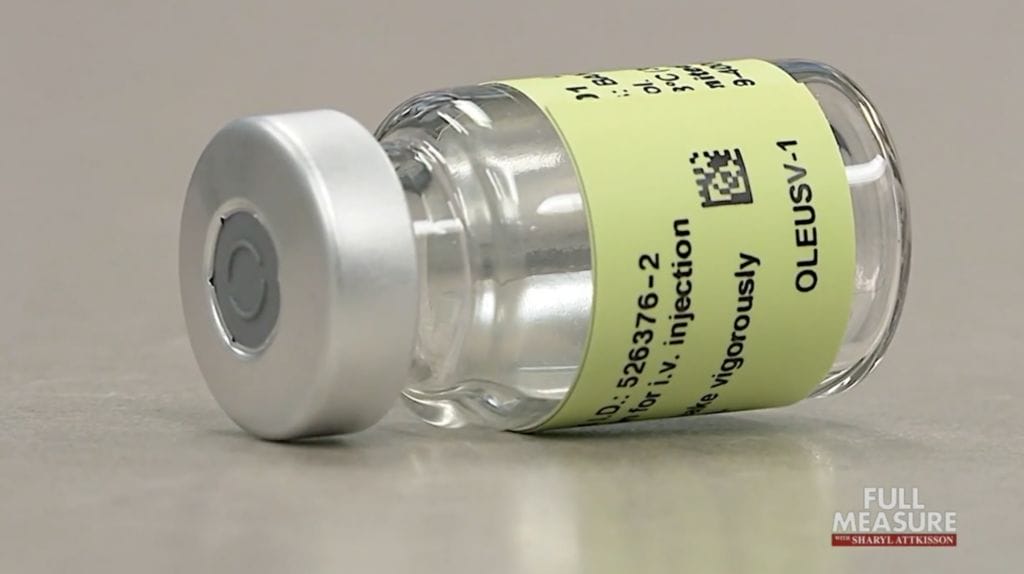Now an important update to our coverage of a new Alzheimer’s drug that drew so much controversy. Aducanumab was approved without one yes vote from the FDA advisory committee. In fact, several members quit over it. And critics say it offers no proof of real benefit but comes with significant health risks. Now, the FDA has given fast track approval to a similar drug made by the same company under what critics see as similar questionable circumstances.
The following is a transcript of a report from “Full Measure with Sharyl Attkisson.” Watch the video by clicking the link at the end of the page.
The new drug is an injection called Lecanemab.
Dr. Sidney Wolfe is with the Health Research Group of the watchdog Public Citizen. He’s criticizing the FDA’s expedited approval, saying there’s no proof of the drug’s real benefit, but plenty of risks.
Dr. Sidney Wolfe: In the study, they showed clearly that, compared to a placebo sugar pill, that the brain swelling was much, much higher. You would get brain swelling just with Alzheimer’s Disease, but it was twice as frequently occurring in the people who got Lecanemab.
To critics like Wolfe, the FDA’s expedited approval of Lecanemab only compounds the fast-tracked approval of a similar drug by the same company, as we’ve reported here on Full Measure:
Aducanumab, sold as Aduhelm, is given as an injection every four weeks. But there’s a long shadow that’s loomed over the medicine ever since the FDA gave it the green light.
Sharyl Attkisson: They approved it even though not one of the advisors they had consulted said it should be approved.
Dr. Caleb Alexander: They did.
Dr. Caleb Alexander was one of the FDA advisors who voted against Aducanumab’s approval. He’s an epidemiologist, internist, and professor at the Johns Hopkins Bloomberg School of Public Health.
Dr. Caleb Alexander: The advisory committee — there was near consensus among the advisory panel that there just wasn’t the evidence to warrant approval.
Much of the controversy centers on the FDA’s overt advocacy of a medicine that had failed miserably during the test phase.
Drugmaker Biogen stopped its two major studies midstream, determining that Aducanumab performed so poorly, it was futile to go on. But within months, Biogen returned to the FDA, claiming to have found some evidence of benefit within the stopped studies. And the FDA enthusiastically endorsed the drug without a single of the completed, large studies normally required.
Dr. Caleb Alexander: But I do think this is really an exceptional setting, not only because of the incredible unmet demand for treatments, but because, in this instance, the FDA’s decision-making appears to have been at such odds with not just the recommendation of the advisory committee members, but also the recommendations of many other parties.
The drugmaker says Aducanumab, sold as Aduhelm, and the newer drug Lecanemab, sold as Leqembi, are effective at removing a sticky type of plaque in the brain that Alzheimer’s produces. Some theorize that plaque makes the disease advance. Critics question whether that’s the case at all, and say the modest impact of the drug shown in early studies isn’t impressive.
One of the Lecanemab study scientists agrees more research is needed, but says, “It’s very exciting because this is the first treatment in our history that shows an unequivocal slowing of decline in Alzheimer’s disease. Would I like the numbers to be higher? Of course, but I don’t think this is a small effect. These results could also indicate a starting point for bigger effects.”
Sharyl: What would be the takeaway for people who aren’t going to dig deep into this issue, but they hear there are new Alzheimer’s drugs that some say could be promising, but they know there’s some criticism?
Dr. Sidney Wolfe: Well, one of the takeaways is that there are a number of, I think, the brighter and more accomplished Alzheimer’s researchers that think that this study on Lecanemab doesn’t show that it really works enough. And the difference between how much less cognitive loss there was between the placebo and the drug is minuscule. One of these people said essentially the difference between the placebo and the drug is so small that doctors wouldn’t recognize it, patients or their families wouldn’t recognize it. It’s too small.
Sharyl (on-camera): Aducanumab’s price was $56,000 per year. The drugmaker slashed that in half when it appeared few if any doctors would prescribe it. Medicare generally won’t pay for it. The new drug, Lecanemab, is going for $26,500 a year wholesale.
Watch update here.

The Lemonade Mermaid Store
Unique gifts for Land or Sea Mermaids, Mer-pets and Little Mermaids!
Left: Pastel Beach Necklace $16




If the FDA approves something, be advised there is money to be made by the FDA and the pharm manufacturer. There is a revolving door between the regulatory agencies and those they regulate. After everyone who takes the drug realizes they’re in a clinical trial with no rules only then will the FDA pull the drug from the market. And they will claim they had no idea the drug didn’t work as advertised. The FDA needs to be burned to the ground.
Amen.
Alzheimer’s disease is frequently caused by a bacterial infection. The amyloid plaque is a protective mechanism to isolate the inflammatory process and the pathogen. This has been documented at autopsy by two pathologists Alan MacDonald MD and Judith Miklossy MD.
The loss of cognition is due to the lack of communication between nerve cells via synapse.
The Deanna protocol is an orthomolecular treatment that reestablishes this communication. WFND has proven this on human ALS and AD nerve cells in vitro.
TQ for posting, this is valuable information.
This Article Sharyl ? Might make many people Jittery to Run out and Purchase and Hord A 1,000 Roll’s of Toilet paper Again ??? ” Who knew Vaccine jitter could drive up Cheeto’s and Charmin Toilet paper hording sales in the 21 first Century, leaving Norah O’ Donnell standing in the Background with fluttering eyebrows in the Nightly news saying store shelves empty again ???